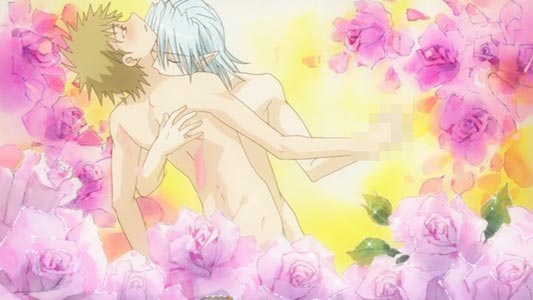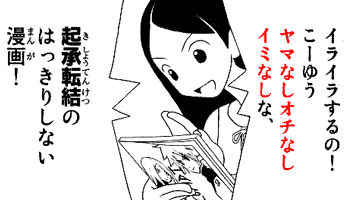In English, yaoi やおい is gay drawn pornography (hentai). Any manga, anime, doujinshi, or fanfic with explicit gay sex is yaoi, although sometimes the term is used more generally toward any gay scenarios. Gay romance for general audiences is sometimes called shounen-ai. The lesbian counterpart is yuri 百合. In Japanese, gay fiction is called BL (Boys' Love), and yaoi is a sub-genre of BL without plot, originally fan works without plot. It stands for Yama nashi Ochi nashi Imi nashi ヤマなしオチなしイミなし, "without climax, punch-line or meaning." It can also be spelled with numbers, as 801.
Right: Maaka Ren 真紅煉
Anime: Karin かりん (Episode 12, Censored)
Definition
The term yaoi refers mainly to explicit gay fiction, but the way it's used in English and in Japanese differs.
In English, yaoi is the most common term for explicit gay fiction. If it's gay porn, it's yaoi, if it's lesbian porn, it's yuri, and if it's not porn, it's called shounen-ai and shoujo-ai for gay and lesbian romance, respectively.
In Japanese, BL is the most common term for gay fiction in general. What's called yaoi and shounen-ai in English is called BL in Japanese, as such, a lot of yaoi-related things in the west are BL-related things in Japan, like:
- The "top" and "bottom" of a gay fanfic are called seme 攻め and uke 受け.
- Gay fiction is marketed at a female audience, not at a gay audience.
- Girls that ship male characters with other male characters are called fujoshi 腐女子, "rotten girls."
For reference, a comparison of searches in Google for yaoi manga and BL manga in Japan versus yaoi manga and BL manga in the United States:
Searches for yaoi やおい are practically nonexistent compared to BL in Japanese. In English, although the numbers are very small in comparison, more people search for yaoi manga than BL manga, which the opposite of what happens in Japan.
vs. Bara
Both yaoi and bara 薔薇 are genres of gay fiction. The difference between yaoi and bara is that yaoi, like BL, targets a female audience, while bara targets a gay, male audience.
In practice, yaoi has "hot guys," ikemen イケメン, and "beautiful boys," bishounen 美少年, that girls find attractive, slender, no facial or body hair, fashionable, so they're basically drawn as the love interest of a shoujo 少女 manga, a prince in search of his princess, except the princess is a dude in this case. Meanwhile, bara will have hairier, more muscular, fatter male characters.
When yaoi is used as a general term for gay scenarios in English, it includes bara artwork made by and for gay audiences.
Acronym
The word yaoi stands for yama nashi ochi nashi imi nashi, which means "no climax, no punch-line, no meaning." The reason it stands for this is that, in Japanese, yaoi is BL without plot, skipping any romantic development and focusing only on the sexual parts.
- yama
山
Mountain.
Climax. (of a story, not climax as in "orgasm," zecchou 絶頂.) - ochi
オチ
"Drop."
Punch-line. Joke. The twist of a story at the end. The point of the story. The conclusion. - imi
意味
Meaning. - X nashi
〇〇無し
Having no X.
Without X.- See also: nai 無い.
- Context: a literary critique.
- iraira suru no!
イライラするの!
[This] annoys [me]!- iraira
イライラ
Feeling of irritation.
- iraira
- kooyuu {yama nashi ochi nashi imi nashi na}, {kishoutenketsu no hakkiri shinai} manga!
こーゆうヤマなしオチなしイミなしな、起承転結のはっきりしない漫画!
This sort of manga [that] {doesn't have a climax, doesn't have a punch-line, and doesn't have a meaning}, [that] {doesn't make clear the kishoutenketsu}.- ki-shou-ten-ketsu
起承転結
Introduction, development, turn and conclusion.
- See also: yonkoma 4コマ.
- ki-shou-ten-ketsu
There's also a backronym for yaoi:
- yamete! oshiri ga itai!
やめて!お尻が痛い!
Stop! [My] butt hurts!
Non-Gay Yaoi
Given what it stands for, yaoi isn't explicitly about gay fiction, it's about skipping the story.
Apparently, it was originally used for works without plot in general, focusing only on the pretty pictures, basically a term for slice of life works focused on moe 萌え. However, many such works were parodies, featuring characters from some series the author liked, presumably what allowed them to skip story and just focus on drawing what they wanted to see, so yaoi became associated with derivative works, and it just happened that most of such works featured gay couples, so yaoi became associated mainly with gay fiction.(dic.pixiv.net, dic.nicovideo.jp)
PWP
The term PWP, "porn without plot," or "Plot? What plot?",(fanlore.org) is a possible translation for yaoi in this plot-less sense. In other words, yaoi is PWP slash fiction.
801
The word yaoi is sometimes spelled 801, with numbers. This is sometimes called goro-awase 語呂合わせ, "sound-matching."
See words spelled with numbers for details.
- ya of yattsu 八つ, "eight."
- o because 0 looks like an "o."
- i of ichi 一, "one."
Combined together, they form ya-o-i, 801.
- In Tonari no Yaoi-Chan となりの801ちゃん, the character Yaoi-chan has her name written as 801-chan, even in the title.
Origin
The origin of the term yaoi originates in a certain gay doujinshi, or rather, a comment about a certain gay doujinshi.
Circa 1979, in the Ishikawa-ken 石川県 prefecture of Japan, there was an "Association for Manga Research" called "Lovely," Manga Kenkyuukai Ravuri 漫画研究会ラヴリ.
They were a group of people trying to become professional mangaka 漫画家 drawing shoujo manga.
The group published a doujinshi with same name, "Lovely," Ravuri, monthly or even bimonthly filled with contributions of its members, then they would critic their own works trying to improve themselves. It was basically a doujin circle.
Images can be found in this blog: くだん書房 - kudan.jp, accessed 2021-05-30.
One day, one of Ravuri's members Mikaru Mikiko (not sure if it's read this way) 磨留美樹子 submitted a certain manga to the group entitled Yaoi 夜追い, meaning "Night Chase."
They took a look and decided it looked very good... but couldn't understand what the story was about.
Because nobody was getting it, Mikiko would later say that the title Yaoi meant yama mo ochi mo imi mo nai ヤマもオチも意味もない, "there is neither climax, conclusion, or meaning."
Having heard such line coming from the mouth of the author, the powers that be joined forces to make pre-internet meme-ing happen. The other authors of Ravuri started using and re-using the line as they read each-others' works.
So, as an in-joke, someone would read a comic by someone else and critic yama ga nai!, "it has no climax!" or ochi ga nai!, "it has no conclusion!" And so on.
The phrase changed form many times. Nowadays, people say yaoi stands for yama nashi ochi nashi imi nashi ヤマなしオチなしイミなし, which means the same thing as the original phrase, except it uses different words.
- yama mo ochi mo imi mo nai (original.)
Without climax, punchline, or meaning. - yama nashi ochi nashi imi nashi (nowadays.)
Without climax, without punchline, without meaning.
The usage spread until it materialized into the very first self-classified Yaoi manga. A doujinshi with no story, no meaning, no climax, no conclusion, no nothing. Just the pretty drawings and the important parts. Just the saucy bits of fictional homosexual stories that would then spiral into modern drawn gay Japanese porn.
So that's the story of how the word yaoi came to be. Some of the people involved into this, and in the Ravuri publications, would later be known as the Year 24 Group, ni-jyuu-yon nen gumi 2 4年組. A group of women said to have contributed greatly to yaoi and gay fiction in manga and in Japan itself. Basically the pioneers of all fujoshi.
Kanji
The word yaoi doesn't have kanji. It's normally spelled with hiragana, as yaoi やおい, or as the number 801.
The doujinshi the term originates from is written with kanji as Yaoi 夜追い, but this spelling isn't used for the term, and most people wouldn't even know where the term originated from in first place.
References
- やおい - dic.nicovideo.jp, accessed 2021-05-31.
- やおい - dic.pixiv.net, accessed 2021-05-31.
- PWP - fanlore.org, accessed 2021-05-31.


No comments: